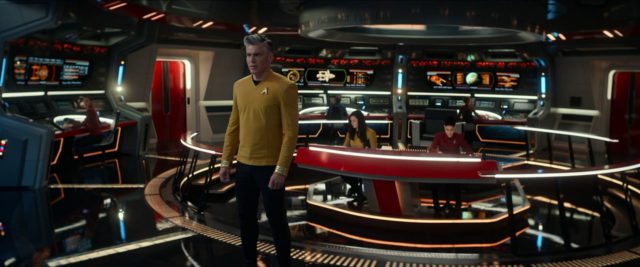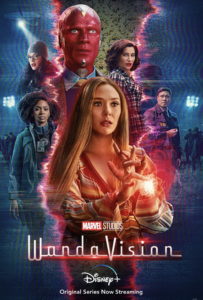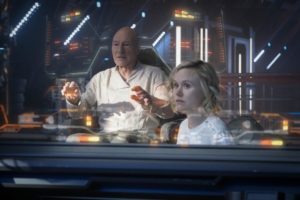As long as I signed up for CBS All Access to watch Star Trek: Picard, something made me decide to watch Star Trek: Voyager. Longtime readers may recall that I was not a fan of The Next Generation, and I only made it through a season and a half of Deep Space Nine before I hit the eject button, as by that time Babylon 5 had sucked all the air out of the room for television science fiction. (It’s still the best SF series I’ve ever seen.) So I had little interest in Voyager when it debuted in 1995.
I think what made me decide to watch it this time was hearing that it had a bunch of time travel episodes, and I’m a sucker for a good time travel episode. Once I decided to watch that many episodes, I figured I’d draw up a list of the supposed best episodes and go through those. I didn’t really have the interest or patience to watch the whole thing, and while I assumed I’d miss out on some nuance of character development over the full 7 seasons, I also figured – based on the other “NuTrek” series between 1987 and 2005 – that characterization would not be the series’ strong suit. If the episodes I came up with ended up being surprisingly great, then I could branch out to some second-tier episodes.
We powered through the 48 episodes on my list (plus one we watched by accident) throughout June and July, and the verdict is: It was okay. Not great. Most episodes were watchable, none were great, none were outright awful. Definitely some disappointments, though. But I doubt I’ll watch any more than this. (It’s over a quarter of the series, which seems sufficient.)
Anyway, spoilers for a 20-year-old TV show in case you care about such things.
Here are the ones we watched, with my grades (on an A-F scale):
- Caretaker (season 1 episodes 1-2) C+
- Parallax (S1 E3) C
- Time and Again (S1 E4) C-
- Eye of the Needle (S1 E7) B
- Non Sequitur (S2 E5) D+
- Deadlock (S2 E21) B-
- Flashback (S3 E2) C
- Future’s End (S3 E8-9) D
- Unity (S3 E17) C+
- Before and After (S3 E21) B+
- Worst Case Scenario (S3 E25) D
- Scorpion (S3 E26, S4 E1) B
- The Gift (S4 E2) C
- Year of Hell (S4 E8-9) D
- Message in a Bottle (S4 E14) B-
- Hunters (S4 E15) C
- Prey (S4 E16) C+
- Living Witness (S4 E23) B
- Demon (S4 E24) C-
- One (S4 E25) C
- Hope and Fear (S4, E26) C
- Drone (S5 E2) B-
- In The Flesh (S5 E4) C
- Timeless (S5 E6) C
- Dark Frontier (S5 E15-16) B
- Course: Oblivion (S5 E18) D+
- The Fight (S5 E19) D (this is the one we watched by accident)
- Relativity (S5 E23) C+
- Equinox (S5 E26, S6 E1) C+
- Survival Instinct (S6 E2) B
- The Voyager Conspiracy (S6 E9) B-
- Pathfinder (S6 E10) C-
- Blink of an Eye (S6 E12) B-
- Memorial (S6 E14) B-
- Collective (S6 E16) C
- Unimatrix Zero (S6 E26, S7 E1) C+
- Repression (S7 E4) C
- Shattered (S7 E11) B+
- The Void (S7 E15) B-
- Homestead (S7 E23) C-
- Endgame (S7 E25-26) B
I also erratically live tweeted watching these episodes, and if you care you can read my at-the-moment reactions in this thread.
For those unfamiliar with Voyager, the premise is that the USS Voyager is captured and taken to the Delta Quadrant by an alien called the Caretaker, along with a ship of insurgents from a group called the Maquis. The ships end up stranded there, with casualties on both, and integrate into a single crew on the Voyager, captained by Katherine Janeway (Kate Mulgrew), who makes the Maquis captain Chakotay (Robert Beltran) her first officer. 75,000 light years away from the Federation, it will take them 75 years to get home, through entirely unknown territory.
“Caretaker” appeared on several best-of-the-series lists, and while it wasn’t a bad episode, I figured if it ended up among the ten best of the series then I was going to be glad I didn’t watch the whole series. Having not watched deep (heh) enough into Deep Space Nine I didn’t have any knowledge of the Maquis, but I could take them on principle. So the first half of the episode was mostly based around Tom Paris (Maquis) and Harry Kim (Starfleet ensign), which was enjoyable enough, but once the Doctor showed up, he overshadowed everyone else as a character.
I didn’t have many episodes in the first 3 seasons in my list, and what I did have wasn’t great. Despite being a bit padded, “Eye of the Needle” was the best episode of the first 2 seasons, with a nifty kicker which I wondered whether it would become relevant near the series’ end (it didn’t). “Before and After” was a touching episode which foreshadowed some future events, but unfortunately those didn’t really play out very satisfyingly either. The other time travel episodes were pretty mediocre. “Future’s End” was sort of the centerpiece of these three seasons, I guess, but it was basically another dumb “go back to the 20th century” yarn.
Maybe the best episode of the whole series was “Scorpion”, which introduced Seven of Nine. It was a solid adventure, gripping at times, with a fairly smart interaction between Voyager and the Borg. Species 8472 is (briefly) a breath of fresh air in introducing aliens which look and feel alien compared to the typical Star Trek fare, and it’s just about the only episode of the series which has a genuine “yeah!” moment when Janeway tells Chakotay to execute “scorpion”.
It’s not exactly all downhill from here, but it’s a bumpy ride from here. The biggest change is that Seven of Nine sucks most of the oxygen from the room as far as characterization goes, as she far overshadows almost everyone else in interest and development. Tom Paris had been nominally the point-of-view character (certainly he seemed to be the one with the best mix of practicality and moral compass), but he gets smothered by Seven. I guess there’s a subplot which leads to him and B’Elanna Torres getting married, but Torres was not a very interesting character to me.
The biggest disappointment of the series was “Year of Hell”, touted as the best episode of the show in at least one list, and teased in “Before and After”. It was basically a big waste of time, the dumbest of time travel stories (everything gets reset at the end), with lots of questionable decisions by Janeway and others. I guess it was trying to ramp up the tension and the stakes, but it was all so artificial and manipulative it was hard to take it seriously. And of course it didn’t track with “Before and After” at all.
“Living Witness” was a nice little surprise in the middle of a bunch of otherwise unremarkable episodes, feature the Doctor being revived 700 years later to help set straight what happened when the Voyager encountered a particular planet on their journey. While not an entirely original premise, it was one of the best executed of its type. I certainly enjoyed it more than the maudlin NextGen episode “The Inner Light”.
The biggest disappointment of Voyager was without a doubt the portrayal of Captain Janeway. While I guess they were aiming to show her as less perfect than Kirk or Picard, in a different way from Sisko, she was written very erratically, often headstrong and stubborn and honestly something of a tin dictator at times. “Year of Hell” had some of this, but the peak of Janeway stupidity was “Equinox”, in which the Voyager encountered another Federation ship, the Equinox, which had also been pulled to the Delta Quadrant by the Caretaker and had been trying to get home despite being a short-term research vessel. That ship ended up making some morally reprehensible choices to try to get home, which by the end of the first half left the Voyager in a bad spot. But in the second half Janeway goes around the bend, engaging in her own morally disgusting actions, and everything comes to an end when the Equinox captain has a change of heart for no apparent reason. A great set-up wasted by lousy writing in the second half.
(Several Equinox crew end up joining the Voyager, and I assume are never mentioned again – they weren’t in any of the episodes I watched.)
Though if she was frustrating as a Captain, her interactions with Seven and Chakotay were her high points. I suspect I missed the full nuance of her mentoring Seven to become a functioning human being, but even the glimpses I got were engaging. Jeri Ryan’s portrayal of Seven as imperious and haughty felt a bit off in her debut as a full Borg, but seemed more and more spot-on as Seven’s personality developed. Seven got many excellent moments, disagreeing with Janeway, confronting other Borg, interacting with one of the few children on the ship. She was surely the high point of the season.
Then, Chakotay ended up filling Tom Paris’ role from the first 3 seasons, as the ship’s even keel and moral compass. One of the final season episodes, “Shattered”, was a clever way of revisiting a number of key moments from the series without doing a clip show, but it was Chakotay as the featured character who held it all together, recruiting and convincing a much younger Janeway to help.
One interesting dynamic was Janeway and Chakotay meeting privately, since they were effectively the only people on the ship who were truly equals. They could air their differences, and argue all they wanted, as long as it was behind closed doors where their reports couldn’t see. This was one of those bits where the show almost seemed to understand what it had – a chance to show the power dynamics among Starfleet personnel, especially in a high-stake scenario – but it mostly treated it as an opportunity for NuTrek’s patented irrelevant character moments, showing things the character liked or remembered or experienced without really giving us a reason to care about it.
What about the rest of the cast? Well, in true NuTrek fashion there were just too many characters for all of them to be treated as major characters. The aliens Neelix and Kes were both somewhere between “just there” and outright annoying (though Kes at least got a good story in “Before and After”). Most of the rest just never really grabbed me, either. Torres was the typical “grumpy former rebel”. Paris also kind of filled that role, but with a vaguely self-destructive, sarcastic attitude, but I wish they’d played up a lot more. Ensign Harry Kim seemed like a cousin to Geordi LaForge, especially in that both of them were a little too earnest and a little too underdeveloped. The real missed opportunity was Tuvok, in whom Tim Russ turned in a pretty good Vulcan performance in the style of Leonard Nimoy, but the character himself was quite generic, and could have just been “Vulcan Science Officer #1”.
The only other character that worked for me was the Doctor, as Robert Picardo immediately brought humanity and humor to the role of the ship’s artificially intelligent medical officer. He got several good stories to play off of characters other than the main cast, including off of himself in “Equinox”. He was also the best part of “Blink of an Eye”, which was a fairly routine “this planet is in a faster time frame than our heroes” story elevated primarily by his performance.
Watching Voyager in 2020, it seems like a series of missed opportunities for story and character development: The ship just flits from place to place with no continuity. When the Equinox showed up I wondered just how they were able to make it through the obstacles Voyager had just barely cleared with far fewer resources. Sometimes they’re badly outclassed by the Borg, other times they’re willing to face them directly. The characters change in very small increments, but mostly there’s no character development here. All of this was par for the course for The Next Generation, making Voyager a natural successor to it, but it’s also very much an 80s/90s series with storytelling that seems shallow by today’s standards. It shows just how far ahead of its time Babylon 5 was compared to Star Trek.
The series finale, “Endgame”, is one of the very few episodes I’d seen before. When I did, I was glad I didn’t sit through 7 years of stories just for that. Watching it again, it works to the extent it does largely because of Kate Mulgrew’s performance as Admiral Janeway, who is driven to save her old crew but is also convinced by her old self to try something different. The story ends very abruptly, with no denouement, no winding down of the characters after they make it back to Earth, despite the backstories they’d all built up. It was pretty disappointing, and other than a brief appearance by Janeway in a NextGen film, and Seven appearing in Picard, I don’t think we learn anything about what happened to the others. (I imagine other media covered this, but I don’t care about anything other than what’s shown in TV and movies.)
So am I glad I watched it? Glad enough, I suppose. It wasn’t bad, but it always felt like the really good stuff was right around the corner… right up until the end, when it still felt that way.




